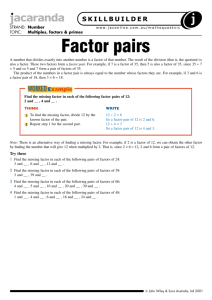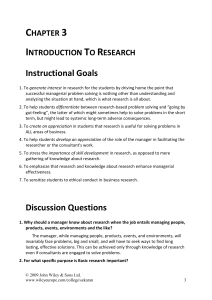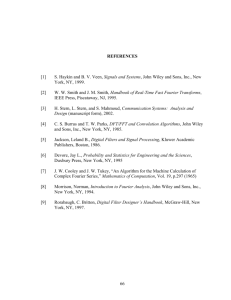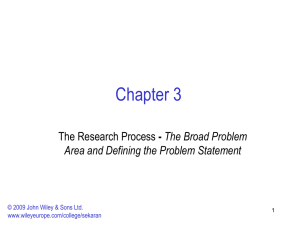File
advertisement
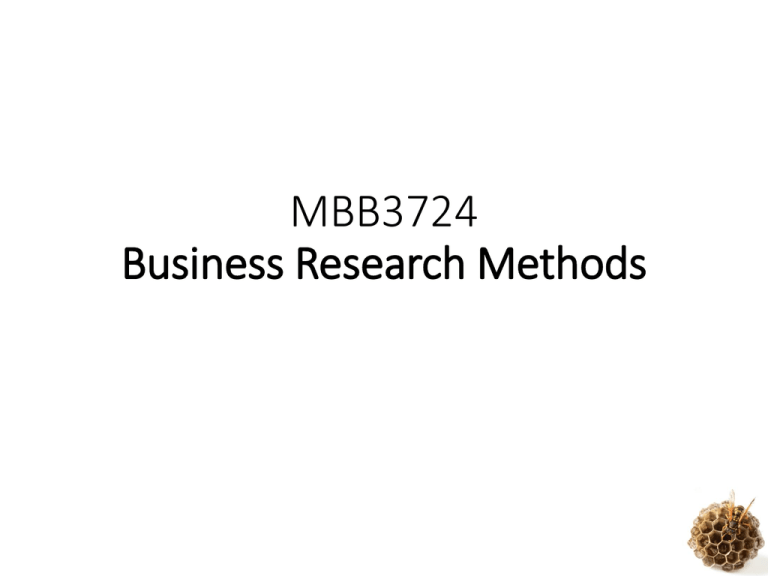
MBB3724 Business Research Methods Introduction to Business Research Course syllabus Research process © 2012 John Wiley & Sons Ltd. www.wiley.com/college/sekaran Definition of Business Research • Business research: an organized and systematic inquiry or investigation into a specific problem, undertaken with the purpose of finding answers or solutions to it. © 2012 John Wiley & Sons Ltd. www.wiley.com/college/sekaran Business Research • Research information is neither intuitive nor haphazardly gathered. • Literally, research (re-search) -“search again” • Business research must be objective • Detached and impersonal rather than biased • It facilitates the managerial decision process for all aspects of a business. "The secret of success is to know something nobody else knows. " Aristotle Onassis Information Reduces Uncertainty I don’t know if we should offer on-site child care? Business Research Types Basic research Applied research Basic Research • Attempts to expand the limits of knowledge. • Not directly involved in the solution to a pragmatic problem. Basic Research Example • Is executive success correlated with high need for achievement? • Are members of highly cohesive work groups more satisfied than members of less cohesive work groups? • Do consumers experience cognitive dissonance in low-involvement situations? Applied Research • Conducted when a decision must be made about a specific real-life problem Applied Research Examples • Should McDonalds add Italian pasta dinners to its menu? • Business research told McDonald’s it should not? • Should Procter & Gamble add a high-priced home teeth bleaching kit to its product line? • Research showed Crest Whitestrips would sell well at a retail price of $44 Applied versus Basic Research • Basic research: generates a body of knowledge by trying to comprehend how certain problems that occur in organizations can be solved. • Applied research: solves a current problem faced by the manager in the work setting, demanding a timely solution. © 2012 John Wiley & Sons Ltd. www.wiley.com/college/sekaran Examples Applied Research • Apple’s iPod fueled the company’s success in recent years, helping to increase sales from $5 billion in 2001 to $32 billion in the fiscal year 2008. Growth for the music player averaged more than 200% in 2006 and 2007, before falling to 6% in 2008. Some analysts believe that the number of iPods sold will drop 12% in 2009. “The reality is there’s a limited group of people who want an iPod or any other portable media player,” one analyst says. “So the question becomes, what will Apple do about it?” • The existing machinery in the production department has had so many breakdowns that production has suffered. Machinery has to be replaced. Because of heavy investment costs, a careful recommendation as to whether it is more beneficial to buy the equipment or to lease it is needed. © 2012 John Wiley & Sons Ltd. www.wiley.com/college/sekaran More Examples of Research Areas in Business • Absenteeism • Communication • Motivation • Consumer decision making • Customer satisfaction • Budget allocations • Accounting procedures © 2012 John Wiley & Sons Ltd. www.wiley.com/college/sekaran Why managers should know about research • Being knowledgeable about research and research methods helps professional managers to: • Identify and effectively solve minor problems in the work setting. • Know how to discriminate good from bad research. • Appreciate the multiple influences and effects of factors impinging on a situation. • Take calculated risks in decision making. • Prevent possible vested interests from exercising their influence in a situation. • Relate to hired researchers and consultants more effectively. • Combine experience with scientific knowledge while making decisions. © 2012 John Wiley & Sons Ltd. www.wiley.com/college/sekaran The Manager–Researcher Relationship • Each should know his/her role • Trust levels • Value system • Acceptance of findings and implementation • Issues of inside versus outside researchers/consultants © 2012 John Wiley & Sons Ltd. www.wiley.com/college/sekaran Internal Researchers • Advantages: • Better acceptance from staff • Knowledge about organization • Would be an integral part of implementation and evaluation of the research recommendations. • Disadvantages • Less fresh ideas • Power politics could prevail • Possibly not valued as “expert” by staff © 2012 John Wiley & Sons Ltd. www.wiley.com/college/sekaran External Researchers • Advantages • Divergent and convergent thinking • Experience from several situations in different organizations • Better technical training, usually • Disadvantages • Takes time to know and understand the organization • Rapport and cooperation from staff not easy • Not available for evaluation and implementation • Costs © 2012 John Wiley & Sons Ltd. www.wiley.com/college/sekaran Hallmarks of scientific research: • Hallmarks or main distinguishing characteristics of scientific research: • Purposiveness • Rigor • Testability • Replicability • Precision and Confidence • Objectivity • Generalizability • Parsimony © 2012 John Wiley & Sons Ltd. www.wiley.com/college/sekaran Hypothetico-Deductive Research • The Seven-Step Process in the HypotheticoDeductive Method • Identify a broad problem area • Define the problem statement • Develop hypotheses • Determine measures • Data collection • Data analysis • Interpretation of data © 2012 John Wiley & Sons Ltd. www.wiley.com/college/sekaran Deduction and Induction • Deductive reasoning: application of a general theory to a specific case. • Hypothesis testing • Inductive reasoning: a process where we observe specific phenomena and on this basis arrive at general conclusions. • Counting white swans • Both inductive and deductive processes are often used in research. © 2012 John Wiley & Sons Ltd. www.wiley.com/college/sekaran Scientific Method • The analysis and interpretation of empirical evidence (facts from observation or experimentation) to confirm or disprove prior conceptions. The Decision-making Process Associated with the Development and Implementation of a Strategy • Identifying problems and opportunities • Diagnosis and assessment • Selecting and implementing a course of action • Evaluating the course of action Evaluation Research • Evaluation research is the formal, objective measurement and appraisal of the extent to which a given activity, project, or program has achieved its objectives. Performance-monitoring Research • Research that regularly provides feedback for evaluation and control • Indicates things are or are not going as planned • Research may be required to explain why something “went wrong” Total Quality Management (TQM) • A business philosophy that embodies the belief that the management process must focus on integrating customer-driven quality throughout the organization. TQM • Stresses continuous improvement of product quality and service. • Managers improve durability and enhance features as the product ages. • Managers strive to improve delivery and other services to keep their companies competitive Determining When to Conduct Business Research • Time constraints • Availability of data • Nature of the decision • Benefits versus costs Determining When to Conduct Business Research Availability of Data Benefits Time Constraints Nature of the Decision vs. Costs Is sufficient time available before a managerial decision must be made? No Yes Is the information already on hand inadequate for making the decision? No Yes Is the decision Yes of considerable strategic or tactical importance? Does the value of the research Yes information exceed the cost of conducting research? No Do Not Conduct Business Research No Conducting Business Research Value versus Costs • Potential Value of a Business Research Effort Should Exceed Its Estimated Costs Value Should Exceed Estimated Costs Costs Value •Decreased certainty •Increased likelihood of a correct decision •Improved business performance and resulting higher profits •Research expenditures •Delay of business decision and possible disclosure of information to rivals •Possible erroneous research results Major Topics for Research in Business • General Business Conditions and Corporate Research • Financial and Accounting Research • Management and Organizational Behavior Research • Sales and Marketing Research • Information Systems Research • Corporate Responsibility Research Cross-functional Teams • Cross-functional teams are composed of individuals from various organizational departments such as engineering, production, finance, and marketing who share a common purpose. Business Research in the 21st Century • Increased globalization • Growth of the Internet and other information technologies Global Research • Business Research is increasingly global • Market knowledge is essential • A.C. Nielsen - more that 67% international business Global Business Research • General information about country - economic conditions and political climate • Cultural and consumer factors • Market and competitive conditions - demand estimation The Internet Is Transforming Society • Time is collapsing. • Distance is no longer an obstacle. • Crossing oceans is only a mouse click away. • People are connected 24 hours a day, seven days a week. • "Instantaneous" has a new meaning. Internet Research • Seeking facts and figures about an issue • Surveys on Web sites
